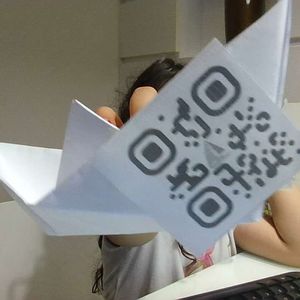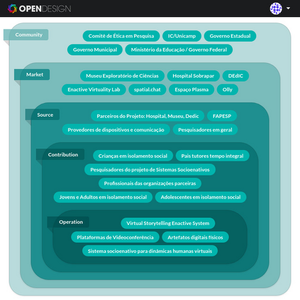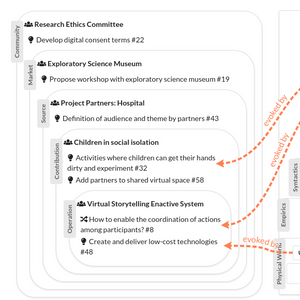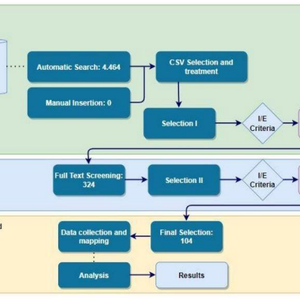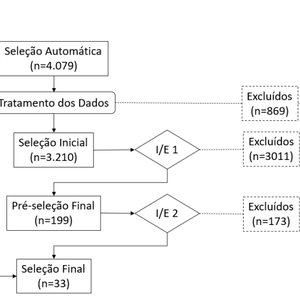Pilot Studies with the Aquarela Virtual System
With the possibility of several people interacting simultaneously, in real time, Aquarela Virtual is a system that has high technical complexity.
In a workshop scenario with a partner institution, it is essential that the system has stability and efficiency, ensuring that technical problems do not interfere with the user experience. To verify and ensure this stability, three pilot studies were conducted internally by the InterHAD research group with Aquarela Virtual.
In the first and second studies, the researchers thoroughly analyzed the functionality and stability of the system, which was significantly improved with the data collected. In the third study, a selected group of geographically distributed children, accompanied by project researchers, successfully interacted with the system, signaling its suitability for use in workshops with partner institutions.
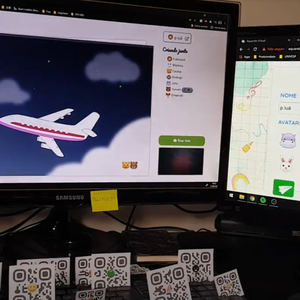
Researcher testing functionalities of Aquarela Virtual
Researcher testing Virtual Watercolor features, with two monitors showing different parts of the system and a collection of printed QR codes positioned over the keyboard.

Child hiding behind emoji
Child hiding behind happy emoji (yellow) while taking a photo while interacting with the "Aquarela Virtual" system

Child showing a castle illustration
Child showing a castle illustration while taking a photo while interacting with the "Aquarela Virtual" system.
SocioEnactive Virtuality OpenDesign
Series of Virtual (and enactive) that used the OpenDesign Platform to idealize the continuity of experiences in socioenactive scenarios, in the face of health restrictions imposed in response to the COVID-19 pandemic. The initiative was motivated by the impossibility of interventions and social-face-to-face interaction, until then essential to the research of the enactive phenomenon, strongly based on the physical presence of those involved and on actions on the environment (physical, social, digital). In addition, the symptoms of hyper virtuality, such as mental fatigue resulting from the excessive use of screens and social media by the researchers themselves, should be addressed.
Based on these challenges, the initial objective of the project was to propose new research scenarios in the context of the project:
- Taking socioenactivity to where people are, considering the context of prolonged social isolation;
- Favor the establishment of meaningful links between people and their environment through corporeality, social interaction and coordinated joint action;
- Build an ' enactive virtuality' with possibilities for creative, affective and embodied interaction in the proposed scenarios.
These efforts led to the development of the Aquarela Virtual and culminated in the holding of workshops with the partner DEdIC.
Systematic Literature Reviews
An essential task in a research project is to survey the state of the art on the researched subject. Systematic literature reviews are important tools for this task.
In the context of the Thematic Project Socioenactive Systems, three systematic reviews of the literature were carried out in parallel. Each with a specific focus: ubiquitous technologies in educational contexts, ubiquitous and pervasive environments in hospitals, and embodiment in interactive installations. Each review brought a different perspective on enactive and socioenative systems to consider, for example, technologies used, modes of interaction with computational technologies, different theoretical frameworks, and different interpretations and applications for related theories and concepts.
As a result, these three reviews were initially published as technical reports, and later subsidized subsequent publications with more specific and in-depth analysis of the results found.
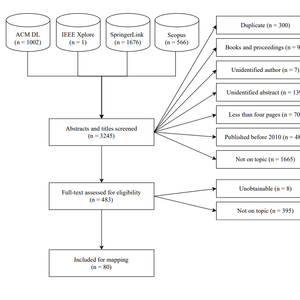
Flow diagram of the systematic review on embodiment in interactive installations
Flow diagram of the systematic review on embodiment in interactive installations, indicating works found and selection criteria.
